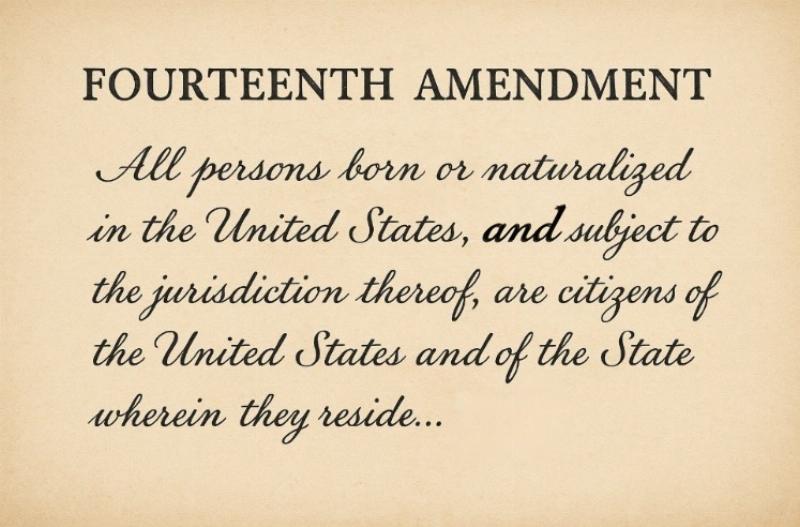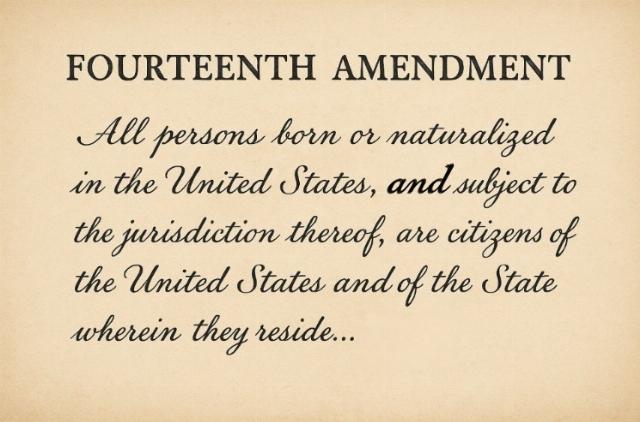


I have been getting just enough email about “birthright citizenship” to suggest that there are some key misunderstandings about the concept and the implications of the Fourteenth Amendment to make one more exploration of the idea worthwhile. So as your resident “splainer,” I’ll try to ‘splain it for you.
The Fourteenth Amendment was adopted on July 9, 1868. It was the final product of a process that Illinois Senator Lyman Trumbull began in 1866. His Civil Rights Act of 1866 stated that “all persons born in the United States and not subject to any foreign power…are hereby declared citizens of the United States…”
President Andrew Johnson didn’t like the bill, so he vetoed it, but Congress overrode his veto. The Fourteenth Amendment changed the language very slightly to “born or naturalized in the United States and subject to the jurisdiction thereof,” but it kept that all-important conjunction, which I’ve highlighted.

Image created using AI.
That three-letter word means that there are two (another three-letter word) conditions that have to be met. They aren’t the same thing. That three-letter conjunction is the source of all the legal arguments. So that you can clearly understand it, let’s look at a unanimous Second Amendment decision called Caetano v. Massachusetts.
The Caetano case dealt with a lady who protected herself from an abusive boyfriend by acquiring a stun gun (similar to a Taser). The Supreme Court ruled that for Massachusetts to ban her stun gun, it had to be both dangerous and unusual. There’s that little three-letter “and” word again.
The state could ban it only if both conditions were met. Matching one wasn’t enough. If it was unusual but not dangerous, sorry, Charlie. Do not pass Go, do not collect $200. Your statute goes directly to Second Amendment jail.
As things turned out, because the stun gun was not unusual, the Supreme Court said they didn’t even need to ask if it was dangerous. It failed the “unusual” leg, so it didn’t matter if it was dangerous. There was no way it could be both if it flunked one of the tests.
Let’s look at Senator Trumbull’s work again. He wasn’t satisfied with just getting his Civil Rights Act passed. He also pushed the Fourteenth Amendment through the committee and finally to the full Senate on June 13, 1866. This was a key part of his legacy, and you may be dead certain that he wasn’t about to contradict himself.
So, when the final draft of the Amendment said that persons “born in the United States and subject to the jurisdiction thereof” were citizens, it meant exactly the same thing as “born here and not subject to any foreign power.” In fact, Senator Trumbull did the ‘splainin’ for me. His exact words were that the phrase meant “subject to the complete jurisdiction thereof” and “not owing allegiance to anybody else.”
The Founders were explicit in rejecting the idea that simply being born somewhere makes you a subject of that country. That key change was part of our great American experiment.
Being born in London used to mean that you were an English subject. But Americans weren’t going to tolerate being subjects anymore. They would forever after be citizens, with all the self-governing rights that status implied. And this is where modern Americans lose the plot. We simply don’t have the lived experience to automatically understand what was being said.
A lot of legal “experts” incorrectly assume that “subject to the jurisdiction” means that if you commit a crime, you can be punished for it. They push this error to eliminate those troublesome three letters by making the two separate and distinct qualifications into a single one. They don’t want to admit that there is a specific meaning for “and.” So they blindly push the idea that a baby’s first breath in the US makes it a citizen, even though the Founders and the authors of the Fourteenth Amendment explicitly rejected that concept.
At the same time, the Founders were willing to prosecute non-citizens. William Duane was one such defendant, although he avoided conviction. Pirates were also non-citizen defendants. And non-citizen immigrants were often prosecuted for minor crimes. Being “subject to prosecution” wasn’t the same as “subject to the jurisdiction” then, and it isn’t now. “Subject to the jurisdiction of a foreign power” means that you are a “subject of that foreign power” and owe your allegiance to that foreign country, not to the US of A.
Grammar is central to legal interpretation. Those three little letters mean that, just as with Caetano, the two specified items are different. Being in the US makes you subject to prosecution. If you smuggle cocaine across the border, your status as a Mexican citizen will be no help. The US legal system will determine your fate. As for birthright citizenship, the issue is different.
If you’re born here, you’re born here. That’s easy. But if your parents aren’t legally in the US, are you subject to the jurisdiction of the US? Most emphatically, no! You don’t owe any loyalty to the US, and that’s what the term means. Let me put that in words that even those in Rio Linda will understand.
If you’re a Mexican citizen, you owe your allegiance to Mexico. It doesn’t matter whether you are traveling to Australia, Russia, or the US. Your allegiance is to Mexico. You are “subject to the jurisdiction of” Mexico.
And if your baby is born in any of those places, it’s still a Mexican citizen because you are a Mexican citizen. This is the principle of jus sanguinus, “right of blood.” Another country may also choose to grant you citizenship, much as Ted Cruz received dual US/Canada citizenship by being born in Toronto with US parents. But the US, whether by law or Constitution, has not made that grant.
Before you throw those rotten vegetables, recall that I discussed the Supreme Court’s decision in Wong Kim Ark, showing that it does not settle the argument. Rather, Wong Kim Ark was a citizen because his parents had established a domicile—something no illegal alien can do—by creating a lawful permanent residence, business, and so on. Since the immigration laws were different then, he became a citizen by being born to lawful permanent residents.
The key issue in the argument is simple. Those three letters, A-N-D, mean that “subject to the jurisdiction” is not the same thing as “born here.” When the Supreme Court reviews the issue, if it looks at the origin of the Fourteenth Amendment and the discussions by its drafters, birthright citizenship will disappear.
Case closed.
Ted Noel is a retired physician who posts on social media as Doctor Ted. His occasional Doctor Ted’s Prescription podcast is available on multiple podcast channels.
